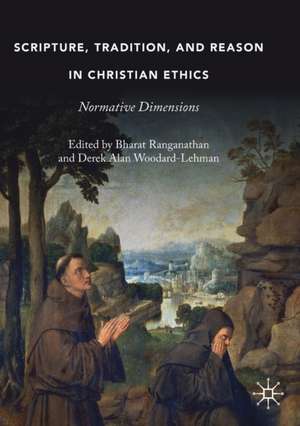Scripture, Tradition, and Reason in Christian Ethics: Normative Dimensions
Editat de Bharat Ranganathan, Derek Alan Woodard-Lehmanen Limba Engleză Paperback – 2 oct 2020
| Toate formatele și edițiile | Preț | Express |
|---|---|---|
| Paperback (1) | 468.12 lei 6-8 săpt. | |
| Springer International Publishing – 2 oct 2020 | 468.12 lei 6-8 săpt. | |
| Hardback (1) | 642.83 lei 6-8 săpt. | |
| Springer International Publishing – 2 oct 2019 | 642.83 lei 6-8 săpt. |
Preț: 468.12 lei
Preț vechi: 550.73 lei
-15% Nou
Puncte Express: 702
Preț estimativ în valută:
89.58€ • 97.28$ • 75.25£
89.58€ • 97.28$ • 75.25£
Carte tipărită la comandă
Livrare economică 23 aprilie-07 mai
Preluare comenzi: 021 569.72.76
Specificații
ISBN-13: 9783030251956
ISBN-10: 3030251950
Pagini: 259
Ilustrații: XIX, 259 p.
Dimensiuni: 148 x 210 mm
Greutate: 0.34 kg
Ediția:1st ed. 2019
Editura: Springer International Publishing
Colecția Palgrave Macmillan
Locul publicării:Cham, Switzerland
ISBN-10: 3030251950
Pagini: 259
Ilustrații: XIX, 259 p.
Dimensiuni: 148 x 210 mm
Greutate: 0.34 kg
Ediția:1st ed. 2019
Editura: Springer International Publishing
Colecția Palgrave Macmillan
Locul publicării:Cham, Switzerland
Cuprins
1. Normative Dimensions in Christian Ethics.- Section I Scripture.- 2. Christian Ethics, the Bible, and the Powers of Reading.- 3. Between Comparison and Normativity: Scriptural Reasoning and Religious Ethics.- 4. The Asceticism of Interpretation: John Cassian, Hermeneutical Askēsis, and Religious Ethics.- Section II Tradition.- 5. Choosing to Become Who You Are: Authority and Freedom in Karl Barth’s Account of Moral Formation.- 6. Natural Law, Freedom, and Tradition: A Catholic Perspective on Mediating Between Liberty and Freedom.- 7. Schelling’s Pauline Anthropology.- Section III Reason. -8. Paul Ramsey’s Christian Deontology.- 9. Union with Christ: Participation as the Ground of Christian Ethics in Augustine and Reformed Augustinianisms.- 10. Mothering Theo-Political Ideology: Natural Law, Empirical Facts, and Discourse Politics.
Notă biografică
Bharat Ranganathan is the Beamer-Schneider SAGES Fellow in Ethics at Case Western Reserve University, USA.
Derek Woodard-Lehman is Lecturer in the Department of Theology and Religion at the University of Otago, New Zealand, where he also serves as the Wellington Programme Coordinator for the Centre for Theology and Public Issues.
Derek Woodard-Lehman is Lecturer in the Department of Theology and Religion at the University of Otago, New Zealand, where he also serves as the Wellington Programme Coordinator for the Centre for Theology and Public Issues.
Textul de pe ultima copertă
How should we understand the relationship between Christian ethics and religious ethics? Among comparative, ethnographic, and normative methodologies? Between confessional and non-confessional orientations, or between theology and philosophy? This volume brings together emerging religious ethicists to engage the normative dimensions of Christian ethics. Focusing on scripture, tradition, and reason, the contributors to this volume argue for a vision of Christian ethics as religious ethics. Toward this end, they engage with scripture, interpretation, and religious practice; examine the putative divide between reason and tradition, autonomy and heteronomy; and offer proposals about the normative characterization of conceptual and practical issues in contemporary religious ethics. Collectively, the volume engages Christian thought to make an argument for the continuing relevance of normative methodologies in contemporary religious and theological ethics.
Caracteristici
Brings together emerging religious ethicists to engage the normative dimensions of Christian Ethics Makes an argument for the continuing relevance of normative methodologies in contemporary religious and theological ethics Written for a range of scholars in religious studies, especially religious ethicists, philosophers of religion, theologians, and moral and political philosophers
